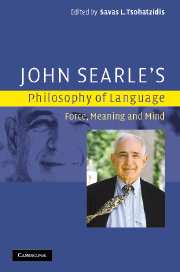Book contents
- Frontmatter
- Contents
- List of contributors
- Acknowledgments
- Introduction
- 1 What is language: some preliminary remarks
- PART I FROM MIND TO MEANING
- 2 Content, mode, and self-reference
- 3 Searle against the world: how can experiences find their objects?
- 4 Seeing what is there
- 5 Intentionalism, descriptivism, and proper names
- 6 On the alleged priority of thought over language
- 7 Rule skepticism: Searle's criticism of Kripke's Wittgenstein
- PART II FROM MEANING TO FORCE
- References
- Index
7 - Rule skepticism: Searle's criticism of Kripke's Wittgenstein
Published online by Cambridge University Press: 08 January 2010
- Frontmatter
- Contents
- List of contributors
- Acknowledgments
- Introduction
- 1 What is language: some preliminary remarks
- PART I FROM MIND TO MEANING
- 2 Content, mode, and self-reference
- 3 Searle against the world: how can experiences find their objects?
- 4 Seeing what is there
- 5 Intentionalism, descriptivism, and proper names
- 6 On the alleged priority of thought over language
- 7 Rule skepticism: Searle's criticism of Kripke's Wittgenstein
- PART II FROM MEANING TO FORCE
- References
- Index
Summary
INTRODUCTION
For almost fifty years now, Ludwig Wittgenstein's reflections on rule-following (Wittgenstein 1953: §§138–242) have been one of the most controversial topics in analytic philosophy. Saul Kripke's book Wittgenstein on Rules and Private Language (Kripke 1982, subsequently WRPL) is the best-known and most provocative interpretation of this difficult material. Almost all leading analytic philosophers working in philosophy of mind and language have commented on Kripke's interpretation (cf. Kusch 2006). In this chapter I shall assess John Searle's contribution to this ongoing discussion. The key text is Searle's “Skepticism about Rules and Intentionality” (Searle 2002: ch. 14, subsequently SRI), an essay in which Searle attacks Kripke's book head on. Although SRI was written in the early 1980s, it was not published until 2002. The time of writing explains why SRI makes no reference to any other contribution in the extensive “Kripkenstein debate.” Searle charges Kripke with misunderstanding Wittgenstein's ideas and he maintains that Kripke's interpretation leaves Wittgenstein with a weak and unconvincing position. I shall seek to defend Kripke on both scores.
KRIPKE'S WITTGENSTEIN
The basic problem of WRPL can be summarized as follows, and independently of conflicting interpretations. Suppose you are calculating an instance of the scheme x + y = z where x and y are larger than in any instance of the scheme that you have calculated so far. Assume for the sake of simplicity that such x and y are 57 and 68 respectively.
- Type
- Chapter
- Information
- John Searle's Philosophy of LanguageForce, Meaning and Mind, pp. 143 - 166Publisher: Cambridge University PressPrint publication year: 2007



